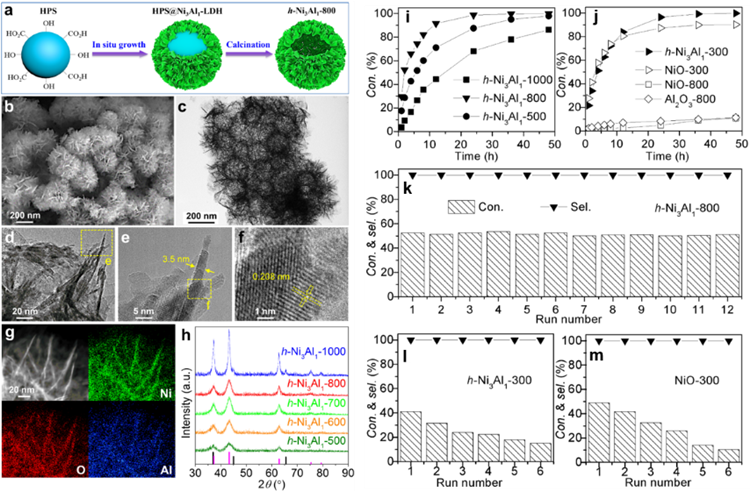Scientists Propose Novel Selective Transfer Hydrogenation Catalysts with Improved Stability
Alcohols are important compounds widely used in the food, fragrance, pharmaceutical and bulk/fine chemical industries. α,β-unsaturated alcohols is a kind of alcohol that can be produced via the hydrogenation of α,β-unsaturated aldehydes.
However, during the hydrogenation process, many byproducts are often obtained due to the competitive hydrogenation among the functional groups (such as C=C and C=O bonds) of α,β-unsaturated aldehydes. It results the low yield of the α,β-unsaturated alcohols and correspondingly increases the cost of purification. Therefore, developing an efficient catalytic process is highly desirable.
Recently, a research team led by Prof. WANG Guanghui from Qingdaoinstitute of Bioenergy and Bioprocess Technology (QIBEBT) of the Chinese Academy of Sciences (CAS), in collaboration with Prof. ZHANG Wenhua from Universityof Science and Technology of China (USTC), reported a new Ni3Al1-oxide hollow nanosphere (h-Ni3Al1-800) derived from Ni3Al1 layered double hydroxide grafted on hollow polymer spheres (HPS@Ni3Al1-LDH) by calcination at 800℃ under air, where the selectivities towards unsaturated alcohols are always higher than 99 % at almost full conversions.
“The hollow structure of the h-Ni3Al1-800 catalyst increases its surface area and porosity, leading to more available active sites. Moreover, the h-Ni3Al1-800 catalyst is very stable under reductive selective transfer hydrogenation (STH) conditions that can be recycled at least 12 times without loss in activity and selectivity,” Prof. WANG said.
“The Al dopant in the h-Ni3Al1-800 provides much stable Niδ+-type (2<δ<3) acid-base pairs and results in the high activity and excellent stability for STH reactions,” Prof. ZHANG said.

Figure 1. The preparation (a), characterization (b-h) and performance (i-m) of different catalysts. (Image by PAN Zhengyi)
Besides, the h-Ni3Al1-800 is applicable for STH in a broad substrate scope with selectivities to corresponding unsaturated alcohols higher than 99 % at full conversion.
This work not only proposes a novel catalyst for STH, but also has potential for industrial applications.
The related progresses were published Oct. 9 in the Journal of MaterialsChemistry A. The work was supported by the National Natural Science Foundation of China and Natural Science Foundation of Shandong Province China.
(Text by PAN Zhengyi)
Contact:
CHENG Jing
Qingdao Institute of Bioenergy and Bioprocess Technology, Chinese Academy of Sciences
Tel: 86-532-80662647/80662622
E-mail: chengjing@qibebt.ac.cn